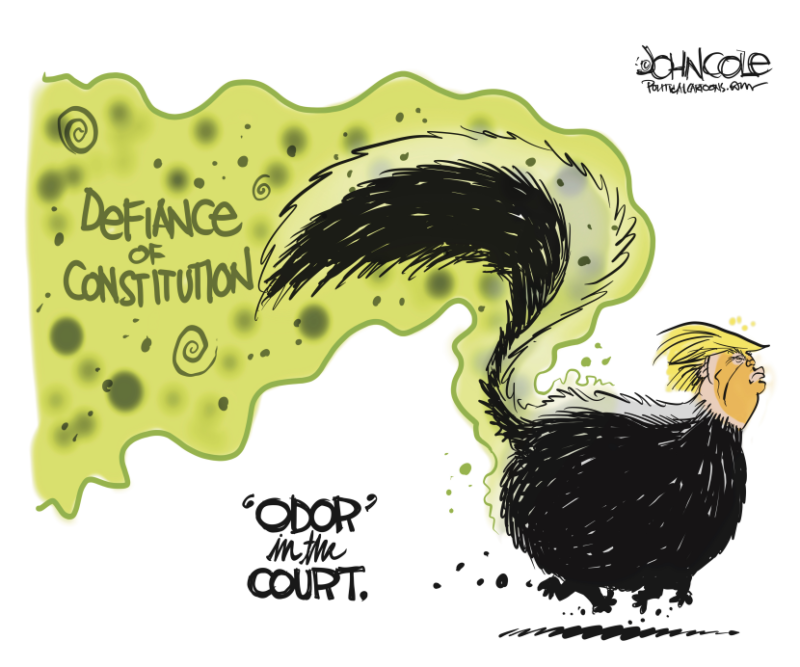
While sunning myself the other day at a Phillies game, I was tempted to pivot to two bros sitting behind me and say: “How about that awesome federal court ruling from J. Harvie Wilkinson! Is that guy eloquent or what?”
The scoreboard said 45,045 fans had flocked to the game. But rest assured that 45,044 didn’t sit there thinking about J. Harvie Wilkinson, the right of due process, the fate of Kilmar Abrego Garcia – nor the fact that an incipient fascist is running amuck like a junkyard dog, gnawing the rule of law like it’s his personal chew toy.
I find it depressingly surreal that we can fill a ballpark on a balmy afternoon, seemingly swaddled in normalcy like it’s any other year while people like Garcia are being disappeared off our streets in defiance of basic human rights and core American principles. It’s all too easy in each ephemeral moment to be deaf, dumb, and blind about what’s going on.
So how fortunate we are that certain members of the federal judiciary – U.S. District judges James Boasberg and Paula Xinis, and even most Supreme Court justices – are confronting Trump and his MAGestapo, most notably on behalf of Garcia. It’s comforting to know that at least one of our venerable institutions refuses to march in goosestep and embrace Selbstgleichschaltung – the Nazi term for “bringing oneself into line.”
But Wilkinson – a federal appeals judge, a Ronald Reagan appointee, a prominent conservative on the bench these past 40 years – tops the list. Having studied all the relevant facts about Garcia (who, unlike Trump, has never been charged or convicted of a crime; who was labeled a terrorist and flown to El Salvador despite a dearth of evidence and despite the MAGA regime’s admission that he was exiled in error), Wilkinson decided last week that enough was enough.
Ruling that the Trump regime should arrange Garcia’s return to the U.S. as soon as possible, Wilkinson scorched the MAGAts with punitive eloquence, warning the administration’s actions “should be shocking not only to judges, but to the intuitive sense of liberty that Americans far removed from courthouses still hold dear.”
Wilkinson freely conceded courts aren’t perfect, but did point out they “instill a fidelity to law that would be sorely missed in their absence.” Then he wrote the passage that should rightly chill Americans:
“The Executive possesses enormous powers to prosecute and to deport, but with powers come restraints. If today the Executive claims the right to deport without due process and in disregard of court orders, what assurance will there be tomorrow that it will not deport American citizens and then disclaim responsibility to bring them home? And what assurance shall there be that the Executive will not train its broad discretionary powers upon its political enemies? The threat, even if not the actuality, would always be present, and the Executive’s obligation to ‘take Care that the Laws be faithfully executed’ would lose its meaning.”
I question whether finely honed sentences can compete with the brute exercise of power. Trump is defying the courts, refusing to return Garcia to this country where he has long lived (and protected by a 2019 court ruling), because, in Trump’s twisted mind, judges are mere speed bumps for his bulldozer.
Wilkinson is wise to the unprecedented danger. He capped his ruling with a wistful plea for peace:
“Now the branches come too close to grinding irrevocably against one another in a conflict that promises to diminish both… We yet cling to the hope that it is not naïve to believe our good brethren in the Executive Branch perceive the rule of law as vital to the American ethos. This case presents their unique chance to vindicate that value and to summon the best that is within us while there is still time.”
We need not ponder whether Trump is capable of summoning whatever passes for the best within him. The time clock is ticking. Most Americans “far removed from courthouses” might not know who Abrego Garcia is, or care a whit what happens to him, but in truth he’s a test case, a way for Trump to determine what he can get away with, a way to potentially stress the courts until they break – and heaven help us if or when that happens.
We already know what could await us at the bottom of the slippery slope. Here’s the bottom: “It is not a judge’s duty to help to enforce a law that’s superior to (the party), or to impose a system of universal values.” Instead, a judge should simply issue rulings “as expressed in the party program.” So said Nazi lawyer Hans Frank, the Reich Commissioner for Justice, in 1936.
Ten years later Frank was hanged by the Allies. Good riddance.
–
Copyright 2025 Dick Polman, distributed exclusively by Cagle Cartoons newspaper syndicate.
Dick Polman, a veteran national political columnist based in Philadelphia and a Writer in Residence at the University of Pennsylvania, writes the Subject to Change newsletter. Email him at [email protected]
















